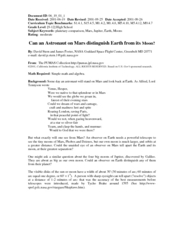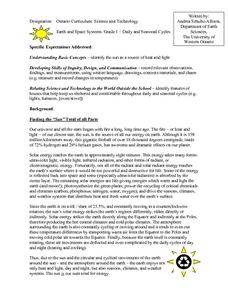Curated OER
Doin' The Moonwalk
If you are looking for an outstanding lesson on the Moon for your budding astronomers, look no further! This outstanding plan is full of wonderful, meaningful activities for your charges to engage in. Pupils will discover why there are...
Curated OER
Exploring the Moon
First graders complete an experiment illustrating why the moon appears to change over time using a flashlight and ball. Students discuss the shape of the moon and identify it as a sphere. Students write a short informational piece after...
Curated OER
Can an Astronaut on Mars Distinguish Earth from its Moon?
Students explore the possibility of being on Mars and being able to identify the Earth. In this space instructional activity students complete a set of calculations to see if this is possible.
Curated OER
Sky 4: The Moon
Pupils will draw the moon's shape for each evening on a calendar and then determine the pattern in the shapes over several weeks. Students' understandings should be confined to observations, descriptions, and finding patterns.
Curated OER
How Big Are Earth, Sun, and Moon?
Third graders draw what they believe is in space on a dry erase board. In groups, they are given a beaker half filled with water and they add a teaspoon of oil, observing the different layers that form. To end the lesson, they identify...
Curated OER
What's Up?
Students compare and contrast the various heavenly bodies found in the sky at night. They identify the moon and stars in the sky as well as how the stars form pictures called constellations. Students also experiment with reflection and...
Curated OER
Space Science
Eighth graders study the objects in our solar system. In this space lesson students identify and describe planets, then classify them as terrestrial or gaseous.
Curated OER
Daily and Seasonal Cycles
First graders identify the sun as a source of heat and light. They identify features of houses that help keep use sheltered and comfortable throughout daily and seasonal cycles. Students are told that summer is the best season to...
Curated OER
Our Sky Clock
Young scholars explore space science by completing a worksheet in class. In this astronomy lesson, students discuss and identify star patterns in the night sky and relate these patterns to the approximate time they appear. Young scholars...
Curated OER
An Introduction to the Night Sky and Movement Astronomy
Basically, this is an interactive exploration of educational astronomy software and an app. Young astronomers discover how the apparent motion of the sky relates to Earth's movements and the position of the observer. It is out of this...
Curated OER
Sky 2: Shadows
Students explore space science by participating in a shadow experiment. For this sky observation lesson, students identify how the sun creates different sized shadows by moving across the horizon. Students utilize yard sticks, markers,...
Curated OER
Solar System (Lesson 2)
Eighth graders identify the objects that make up the solar system. They define new vocabulary and practice using them. They discover that the sun is a star.
Curated OER
Measuring the Speed of Light
Students explore physics by completing measurement problems in class. In this speed of light lesson, students discuss the importance of knowing the speed of light and how it affects many aspects of human life on Earth. Students identify...
Curated OER
Sky 3: Modeling Shadows
Students will construct models to demonstrate their understanding of shadows. Many questions and suggestions for variants on the activities are presented to allow you to tailor this lesson to your particular needs. It is best to make the...
Curated OER
Science: Bees: An Interdisciplinary Approach
Students investigate the world of bees and describe their characteristics. by identifying the bees' parts, they demonstrate how these parts function. In the lab, students dissect bees and view the various parts under microscopes. ...
Curated OER
Our Place in Space
Third graders identify the different planets that make up the solar system. In this space science activity, 3rd graders construct a scale model of the major planets. They explore their different unique features and dress up as planets.
Curated OER
Sky 2: Shadows
students will explore making shadows and tracking the movement of an object over the course of a day to look for patterns. It is best to couple this shadow activity with reading the book, Bear Shadow, and making a map of Bear's...
Curated OER
Objects in the Sky
Students explore what the sky looks like at different times. They identify objects in the sky and recognize changes over time. Students observe the sky and look for objects that are common in both the daytime and the nighttime sky.
Curated OER
The 'Solar' System Past and Present
Students identify cardinal and intermediate directions, recognize that models changes due to new or improved observations and technology, identify the major characteristics of the planets including their positions in the solar system,...
Curated OER
How Do Clouds Form?
Students describe how they believe clouds form. They observe the different types of clouds they see and identify the types. They examine what affects the size and shape of clouds.
Curated OER
Water 1: Water and Ice
Students explore forms that water can take. For this science lesson, students participate in hands-on activities that require them to change water to a solid and back to a liquid again.
Curated OER
Modeling Shadows
Students demonstrate understanding of shadows by creating a physical model of concepts taught.
Curated OER
Water 1: Water and Ice
Students explore forms that water can take and examine the water cycle. In this hands-on science lesson, students participate in activities that require them to change water to a solid and back to a liquid again.
Curated OER
Water and Ice
Students explore water and ice. In this 3 states of matter lesson, students work with a partner to observe, illustrate, and describe the characteristics of an ice cube in a cup. The ice cube is observed again in 15 minutes and changes...
























